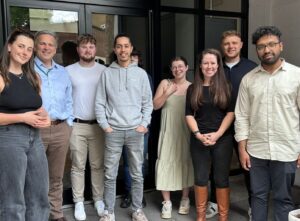How AI Will Further Change The Computer Sciences Market: Our Overview

Artificial intelligence, commonly known by the abbreviation AI, has been a hot topic for some time now. However, it really came to the fore at the end of 2022, with the launch of the eerily creepy human mimicking ChatGPT. Since its launch, the tool has led to many new uses for AI and created a conversation throughout society about the safety and proper use of these solutions.
With its ability to simulate human intelligence, learn from vast datasets, and make informed decisions, AI has become a game-changer in various industries, revolutionising the way we interact with machines, analyse data, and tackle complex challenges. In the dynamic realm of computer sciences, AI has emerged as a formidable force, reshaping the landscape and offering unprecedented opportunities for growth and innovation.
If you’re interested in how AI will continue to change the computer sciences market over the coming years, then this is the article for you. Whether you are a seasoned tech enthusiast, an aspiring computer scientist, or a curious mind eager to explore the possibilities of AI, this overview aims to provide valuable insights into the compelling fusion of AI and the computer sciences market.
Improving Testing Processes
Thanks to its speed and knowledge, AI is revolutionising the way software and systems are developed, tested, and maintained. It enables automated testing, continuous integration, and continuous deployment (CI/CD) pipelines, which can significantly speed up development cycles, reduce human errors, and enhance overall software quality, making it a vital part of the software development cycle. As such, companies will be looking to embrace AI in the testing process to reduce the need for human staff and improve the quality of their output.
Helping Businesses Connect With Clients On A Personal Level
One of the most significant and instantly-noticeable changes that we’ve seen since the introduction of ChatGPT is how AI algorithms have transformed the way businesses interact with their customers. Personalisation and recommendation systems use AI to understand user preferences and behaviour, leading to tailored experiences and increased customer engagement. That means that companies can adapt marketing materials to suit the needs of individual customers and quickly create unique communications that answer specific questions.
Creating Valuable Audio/ Verbal Tools
AI tools are no longer limited to covering the written word: Natural Language Processing (NLP) has advanced rapidly, allowing machines to understand, process, and generate human language more effectively. This capability has opened up new opportunities for chatbots, voice assistants, and other human-computer interaction interfaces. As a result, we will soon see even more audio and verbal tools that use AI technology being integrated into the corporate and consumer landscapes.
Crafting Unique Images
Possibly one of the most remarkable achievements of AI within the computer sciences market is its ability to create stunning, lifelike images that rival those crafted by human artists. Through the amalgamation of deep learning, computer vision, and generative adversarial networks (GANs), AI has ushered in a new era of creativity, opening doors to uncharted territories of artistic expression. As AI continues to evolve, we can expect even more sophisticated and nuanced AI-generated images that blur the lines between reality and imagination. Improved models will likely facilitate the creation of images with higher fidelity, greater diversity, and increased realism, making AI an indispensable ally in the realm of creative expression. These images can help to reduce costs for marketing campaigns, allow for greater creativity and much more. With so many applications, these solutions will likely be some of the most popular and well-used in the future.
Making Computer Science Skills More Valuable
As AI tools are made and taught by experts in computer science, the rising popularity of these solutions will inevitably lead to a greater need for computer science professionals. Workers who are looking to enhance their skills in this niche might want to consider earning qualifications like an online computer science master’s from a provider like Abertay University. If you’re interested in learning more, you can see the university’s website for more information on entry requirements and how the course could enhance your future career.
Enhancing Cybersecurity
As cyber threats become more sophisticated, AI plays a crucial role in identifying and mitigating security breaches. AI-powered algorithms can detect anomalies, predict potential attacks, and respond to incidents faster than traditional security methods, making them vital in the fight against online crime. However, AI is also being used by cybercriminals to create more sophisticated phishing communications and speed up attacks, so the cybersecurity market needs to always stay one step ahead of its adversaries to ensure that it triumphs and keeps internet users safe at all times.
Reshaping The Education Landscape
When you think of technology in learning, it’s easy to remember those old projectors or the awful smart whiteboards that never quite worked. However, those days are behind us, and for the next generation, AI is reshaping the education sector by offering personalised learning experiences and intelligent tutoring systems. It can adapt to individual learning styles, assess student performance, and provide targeted feedback, meaning that teachers can deliver lessons and learning materials that are designed around the needs of today’s students.
Driving Change In Healthcare
Another market where AI is having a major impact is healthcare. These tools offer a plethora of innovative solutions that enhance patient care, optimise workflows, and accelerate medical research. With its ability to analyse vast amounts of medical data and identify patterns that may elude human comprehension, AI is reshaping the landscape of healthcare and driving unprecedented advancements in diagnosis, treatment, and patient outcomes. Specifically, the concept of personalized medicine, or tailoring treatments to individual patients based on their unique genetic makeup and other health factors, has been significantly amplified by AI. Machine learning algorithms can analyze genomic data to identify specific genetic markers associated with diseases, allowing clinicians to prescribe targeted therapies with higher efficacy and fewer side effects.
Changing The Way We See The World
While it can’t be injected into our eyes, AI-powered tools like goggles or VR headsets can be used to reshape the way we see things and provide instant insights. As such, AI-powered computer vision has found applications in various fields, such as healthcare, automotive, retail, and agriculture. It can be used for medical diagnosis, autonomous vehicles, facial recognition, and quality control in manufacturing, and over the years ahead, it will likely have additional applications.
Increasing The Push Towards Greater Regulation
As AI tools become more prevalent and companies start to realise their potential, there will be a greater demand for regulation. Already, the rapid rise of this and other similar tools led to many, including the head of the company that made ChatGPT to call for regulation on AI tools. While some rules are being put into place, regulators will need to act quickly to ensure that they create safe online spaces for everyone and that these tools aren’t used for nefarious purposes by unscrupulous individuals or organisations.
In Summary: The Future Remains Uncertain But Bright
Looking ahead, AI’s impact on the computer sciences market depends on various factors, including technological advancements, regulatory landscape, and societal acceptance. As AI continues to evolve, it will bring both challenges and opportunities to the computer sciences market, transforming how businesses operate and how individuals interact with technology. For researchers and developers, the possibilities are endless, and they will undoubtedly continue to explore new AI models, algorithms, and applications, further fuelling even greater innovation in this vibrant and bold industry moving forward.






